同等学力英语语法总结
- 格式:docx
- 大小:28.94 KB
- 文档页数:23
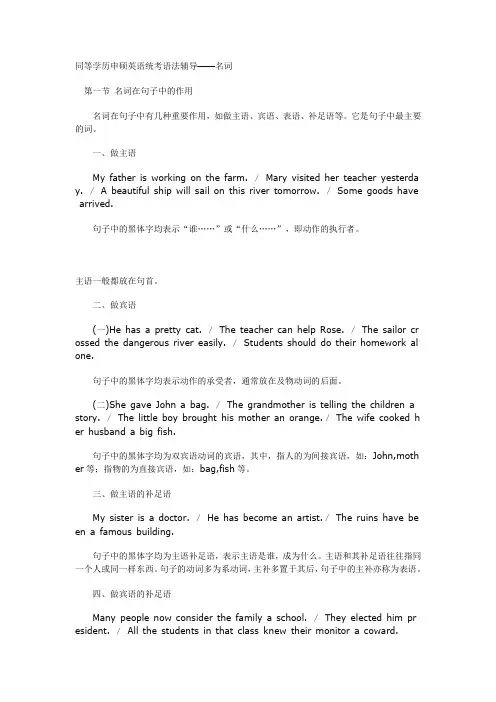
同等学历申硕英语统考语法辅导——名词第一节名词在句子中的作用名词在句子中有几种重要作用,如做主语、宾语、表语、补足语等。
它是句子中最主要的词。
一、做主语My father is working on the farm. /Mary visited her teacher yesterda y. /A beautiful ship will sail on this river tomorrow. /Some goods have arrived.句子中的黑体字均表示“谁……”或“什么……”,即动作的执行者。
主语一般都放在句首。
二、做宾语(一)He has a pretty cat. /The teacher can help Rose. /The sailor cr ossed the dangerous river easily. /Students should do their homework al one.句子中的黑体字均表示动作的承受者,通常放在及物动词的后面。
(二)She gave John a bag. /The grandmother is telling the children a story. /The little boy brought his mother an orange./The wife cooked h er husband a big fish.句子中的黑体字均为双宾语动词的宾语,其中,指人的为间接宾语,如:John,moth er等;指物的为直接宾语,如:bag,fish等。
三、做主语的补足语My sister is a doctor. /He has become an artist./The ruins have be en a famous building.句子中的黑体字均为主语补足语,表示主语是谁,成为什么。
主语和其补足语往往指同一个人或同一样东西。

同等学力申请硕士学位英语语法——定语从句讲义限定性定语从句定语从句非限定性定语从句两步解题法1.抓先行项(指人、物、整句话内容)2.抓关系词在定语从句中的成分关系代词--作主、宾、表、定语关系词关系副词--作状语关系代词指代对象在从句中的成分能否省略that人、物主、宾、表作宾语,可省(介)which物、句子主、宾、表作宾语,可省who人主(非正式做宾)不能省(介)whom人宾可省whose人、物定不能省as人、物、句子主、宾、表不能省than物主、宾、表不能省关系副词指代对象在从句中的成分能否省略when=on which时间n时间状语不能省where=in which地点n地点状语不能省why=for which原因原因状语不能省e.g.This is the house____①I once lived.②I once visited.①where/in which②that/which/XThis is the very house____I once visited.e.g.I’ll never forget the day___①I met him.②I spent with him.①when/on which②that/which/XI’ll never forget the very day___I spent with him.词___+句子A whatB whichC that词,___+句子A whatB whichC thatn介词+which+主+谓+宾介词+whom+主+谓+宾固搭固搭The food on which he depends is expensive.We need a chairman in whom we have confidence.have confidence in be confident ofWe were struck by the extend to which the teacher’s decision served the interests of the school rather than those of the students.I listen to what he said.…set at C they would be if….A whichB thatC whatD who①固定搭配②介词与like区别③原因状从④比较状从as⑤方式状从⑥让步倒装⑦时间状从⑧定语从句as引导的限定性定语从句such…as(不完整句子)the same…as(不完整句子)注意与such…that区别such…that(完整句子)e.g.It wasn’t such a good dinner B she had promised us.A.thatB.asC.whichD.whatpromise sb sthe.g.There was such a long line at the exhibition A we had to wait for about an hour.A.thatB.asC.soD.hencewait for me for a long timee.g.It is language B distinguishes man from the rest of the animal world.A.whatB.thatC.Aswhose表所属关系“…的”n+(,)whose+n.I know a girl whose name is Mary.I like the room whose window faces the south. The book,the cover B is broken,isn’t mine.A whose B.of whichThe book,A cover is broken,isn’t mine.A.whoseB.of which。
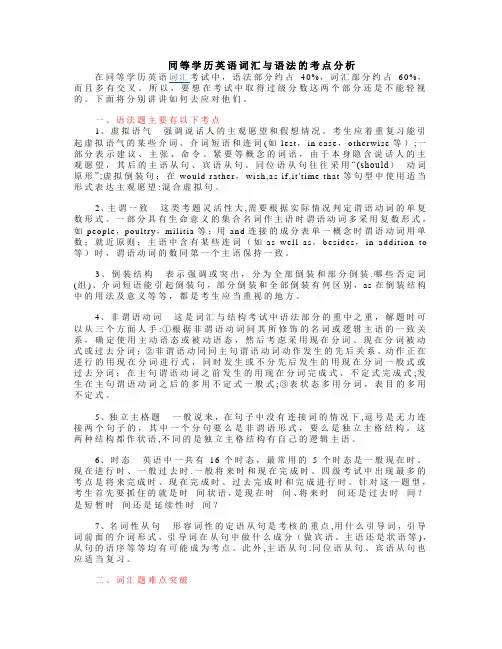
同等学历英语词汇与语法的考点分析在同等学历英语词汇考试中,语法部分约占40%,词汇部分约占60%,而且多有交叉。
所以,要想在考试中取得过级分数这两个部分还是不能轻视的。
下面将分别讲讲如何去应对他们。
一、语法题主要有以下考点1、虚拟语气强调说话人的主观愿望和假想情况。
考生应着重复习能引起虚拟语气的某些介词、介词短语和连词(如lest,in case,otherwise等);一部分表示建议、主张、命令、紧要等概念的词语,由于本身隐含说话人的主观愿望,其后的主语从句、宾语从句。
同位语从句往往采用“(should)动词原形”;虚拟倒装句;在would rather,wish,as if,it'time that等句型中使用适当形式表达主观愿望:混合虚拟句。
2、主谓一致这类考题灵活性大,需要根据实际情况判定谓语动词的单复数形式。
一部分具有生命意义的集合名词作主语时谓语动词多采用复数形式,如people,poultr y,militia等;用and连接的成分表单一概念时谓语动词用单数;就近原则;主语中含有某些连词(如as well as,besides,in addition to 等)时,谓语动词的数同第一个主语保持一致。
3、倒装结构表示强调或突出,分为全部倒装和部分倒装.哪些否定词(组)、介词短语能引起倒装句,部分倒装和全部倒装有何区别,as在倒装结构中的用法及意义等等,都是考生应当重视的地方。
4、非谓语动词这是词汇与结构考试中语法部分的重中之重,解题时可以从三个方面人手:①根据非谓语动词同其所修饰的名词或逻辑主语的一致关系,确定使用主动语态或被动语态,然后考虑采用现在分词、现在分词被动式或过去分词;②非谓语动同同主句谓语动词动作发生的先后关系。
动作正在进行的用现在分词进行式,同时发生或不分先后发生的用现在分词一般式或过去分词;在主句谓语动词之前发生的用现在分词完成式、不定式完成式;发生在主句谓语动词之后的多用不定式一般式;③表状态多用分词,表目的多用不定式。
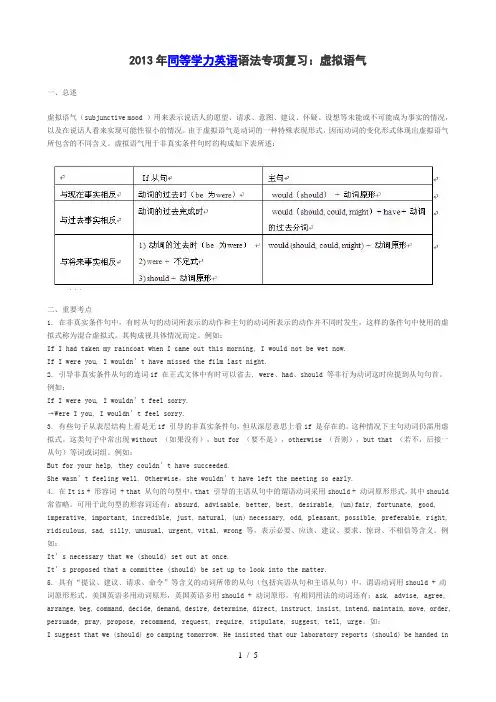
2013年同等学力英语语法专项复习:虚拟语气一、总述虚拟语气(subjunctive mood )用来表示说话人的愿望、请求、意图、建议、怀疑、设想等未能或不可能成为事实的情况,以及在说话人看来实现可能性很小的情况。
由于虚拟语气是动词的一种特殊表现形式,因而动词的变化形式体现出虚拟语气所包含的不同含义。
虚拟语气用于非真实条件句时的构成如下表所述:二、重要考点1. 在非真实条件句中,有时从句的动词所表示的动作和主句的动词所表示的动作并不同时发生,这样的条件句中使用的虚拟式称为混合虚拟式。
其构成视具体情况而定。
例如:If I had taken my raincoat when I came out this morning, I would not be wet now.If I were you, I wouldn’t have missed the film last night.2. 引导非真实条件从句的连词if 在正式文体中有时可以省去, were、had、should 等非行为动词这时应提到从句句首。
例如:If I were you, I wouldn’t feel sorry.→Were I you, I wouldn’t feel sorry.3. 有些句子从表层结构上看是无if 引导的非真实条件句,但从深层意思上看if 是存在的。
这种情况下主句动词仍需用虚拟式。
这类句子中常出现without (如果没有),but for (要不是),otherwise (否则),but that (若不,后接一从句)等词或词组。
例如:But for your help, they couldn’t have succeeded.She wasn’t feeling well. Otherwise,she wouldn’t have left the meeting so early.4. 在It is + 形容词 + that 从句的句型中,that 引导的主语从句中的谓语动词采用should + 动词原形形式,其中should 常省略。
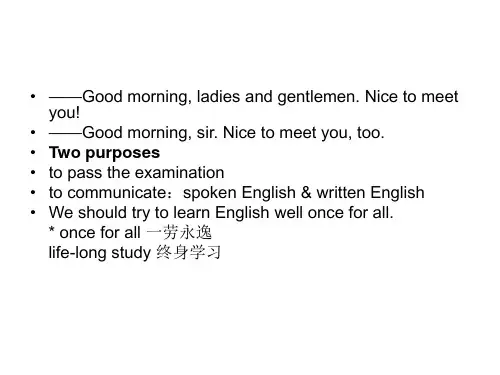
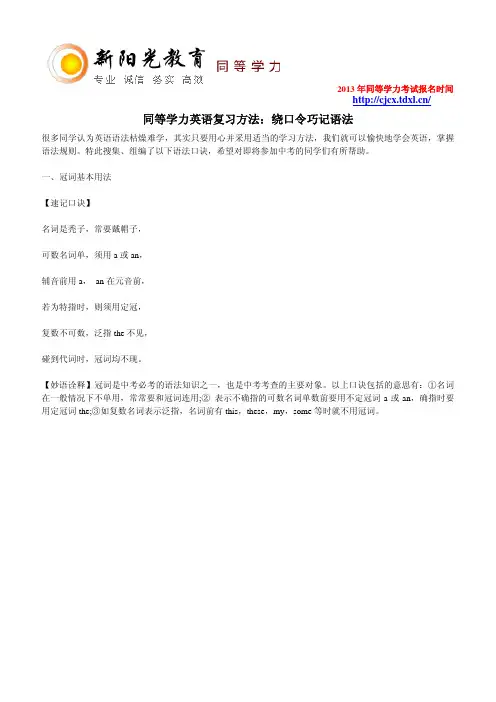
2013年同等学力考试报名时间
/
同等学力英语复习方法:绕口令巧记语法
很多同学认为英语语法枯燥难学,其实只要用心并采用适当的学习方法,我们就可以愉快地学会英语,掌握语法规则。
特此搜集、组编了以下语法口诀,希望对即将参加中考的同学们有所帮助。
一、冠词基本用法
【速记口诀】
名词是秃子,常要戴帽子,
可数名词单,须用a或an,
辅音前用a, an在元音前,
若为特指时,则须用定冠,
复数不可数,泛指the不见,
碰到代词时,冠词均不现。
【妙语诠释】冠词是中考必考的语法知识之一,也是中考考查的主要对象。
以上口诀包括的意思有:①名词在一般情况下不单用,常常要和冠词连用;②表示不确指的可数名词单数前要用不定冠词a或an,确指时要用定冠词the;③如复数名词表示泛指,名词前有this,these,my,some等时就不用冠词。
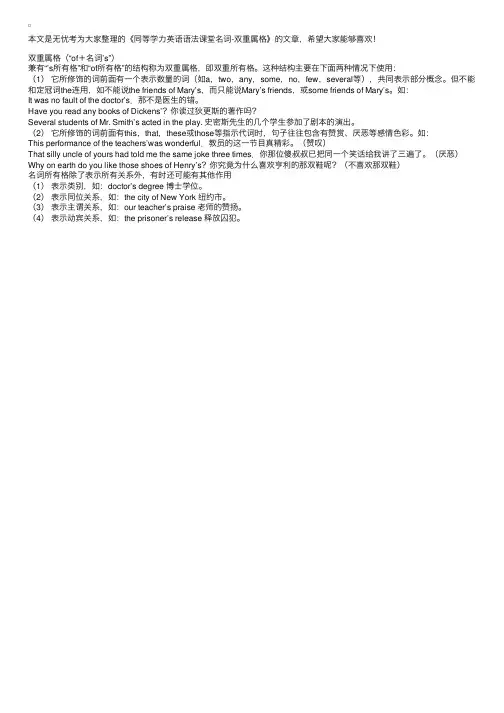
本⽂是⽆忧考为⼤家整理的《同等学⼒英语语法课堂名词-双重属格》的⽂章,希望⼤家能够喜欢!双重属格(“of+名词’s”)兼有“’s所有格”和“of所有格”的结构称为双重属格,即双重所有格。
这种结构主要在下⾯两种情况下使⽤:(1)它所修饰的词前⾯有⼀个表⽰数量的词(如a,two,any,some,no,few,several等),共同表⽰部分概念。
但不能和定冠词the连⽤,如不能说the friends of Mary’s,⽽只能说Mary’s friends,或some friends of Mary’s。
如:It was no fault of the doctor’s.那不是医⽣的错。
Have you read any books of Dickens’?你读过狄更斯的著作吗?Several students of Mr. Smith’s acted in the play. 史密斯先⽣的⼏个学⽣参加了剧本的演出。
(2)它所修饰的词前⾯有this,that,these或those等指⽰代词时,句⼦往往包含有赞赏、厌恶等感情⾊彩。
如:This performance of the teachers’was wonderful.教员的这⼀节⽬真精彩。
(赞叹)That silly uncle of yours had told me the same joke three times.你那位傻叔叔已把同⼀个笑话给我讲了三遍了。
(厌恶)Why on earth do you like those shoes of Henry’s?你究竟为什么喜欢亨利的那双鞋呢?(不喜欢那双鞋)名词所有格除了表⽰所有关系外,有时还可能有其他作⽤(1)表⽰类别,如:doctor’s degree 博⼠学位。
(2)表⽰同位关系,如:the city of New York 纽约市。
(3)表⽰主谓关系,如:our teacher’s praise ⽼师的赞扬。
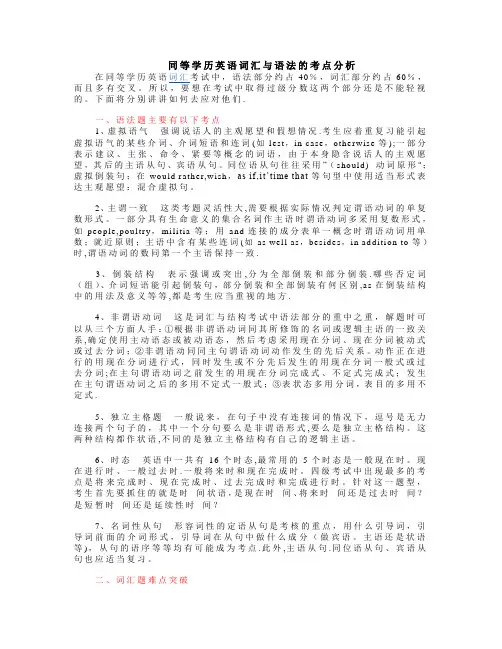
同等学历英语词汇与语法的考点分析在同等学历英语词汇考试中,语法部分约占40%,词汇部分约占60%,而且多有交叉。
所以,要想在考试中取得过级分数这两个部分还是不能轻视的。
下面将分别讲讲如何去应对他们.一、语法题主要有以下考点1、虚拟语气强调说话人的主观愿望和假想情况.考生应着重复习能引起虚拟语气的某些介词、介词短语和连词(如lest,in case,otherwise等);一部分表示建议、主张、命令、紧要等概念的词语,由于本身隐含说话人的主观愿望,其后的主语从句、宾语从句。
同位语从句往往采用“(should) 动词原形";虚拟倒装句;在would rather,wish,as if,it’time that等句型中使用适当形式表达主观愿望:混合虚拟句。
2、主谓一致这类考题灵活性大,需要根据实际情况判定谓语动词的单复数形式。
一部分具有生命意义的集合名词作主语时谓语动词多采用复数形式,如people,poultr y,militia等;用and连接的成分表单一概念时谓语动词用单数;就近原则;主语中含有某些连词(如as well as,besides,in addition to等)时,谓语动词的数同第一个主语保持一致.3、倒装结构表示强调或突出,分为全部倒装和部分倒装.哪些否定词(组)、介词短语能引起倒装句,部分倒装和全部倒装有何区别,as在倒装结构中的用法及意义等等,都是考生应当重视的地方.4、非谓语动词这是词汇与结构考试中语法部分的重中之重,解题时可以从三个方面人手:①根据非谓语动词同其所修饰的名词或逻辑主语的一致关系,确定使用主动语态或被动语态,然后考虑采用现在分词、现在分词被动式或过去分词;②非谓语动同同主句谓语动词动作发生的先后关系。
动作正在进行的用现在分词进行式,同时发生或不分先后发生的用现在分词一般式或过去分词;在主句谓语动词之前发生的用现在分词完成式、不定式完成式;发生在主句谓语动词之后的多用不定式一般式;③表状态多用分词,表目的多用不定式.5、独立主格题一般说来,在句子中没有连接词的情况下,逗号是无力连接两个句子的,其中一个分句要么是非谓语形式,要么是独立主格结构。
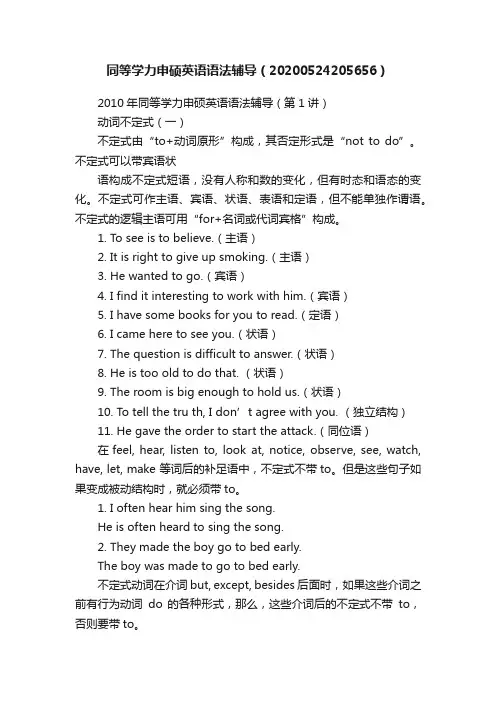
同等学力申硕英语语法辅导(20200524205656)2010年同等学力申硕英语语法辅导(第1讲)动词不定式(一)不定式由“to+动词原形”构成,其否定形式是“not to do”。
不定式可以带宾语状语构成不定式短语,没有人称和数的变化,但有时态和语态的变化。
不定式可作主语、宾语、状语、表语和定语,但不能单独作谓语。
不定式的逻辑主语可用“for+名词或代词宾格”构成。
1. To see is to believe.(主语)2. It is right to give up smoking.(主语)3. He wanted to go.(宾语)4. I find it interesting to work with him.(宾语)5. I have some books for you to read.(定语)6. I came here to see you.(状语)7. The question is difficult to answer.(状语)8. He is too old to do that. (状语)9. The room is big enough to hold us.(状语)10. To tell the tru th, I don’t agree with you. (独立结构)11. He gave the order to start the attack.(同位语)在feel, hear, listen to, look at, notice, observe, see, watch, have, let, make 等词后的补足语中,不定式不带to。
但是这些句子如果变成被动结构时,就必须带to。
1. I often hear him sing the song.He is often heard to sing the song.2. They made the boy go to bed early.The boy was made to go to bed early.不定式动词在介词but, except, besides后面时,如果这些介词之前有行为动词do 的各种形式,那么,这些介词后的不定式不带to,否则要带to。
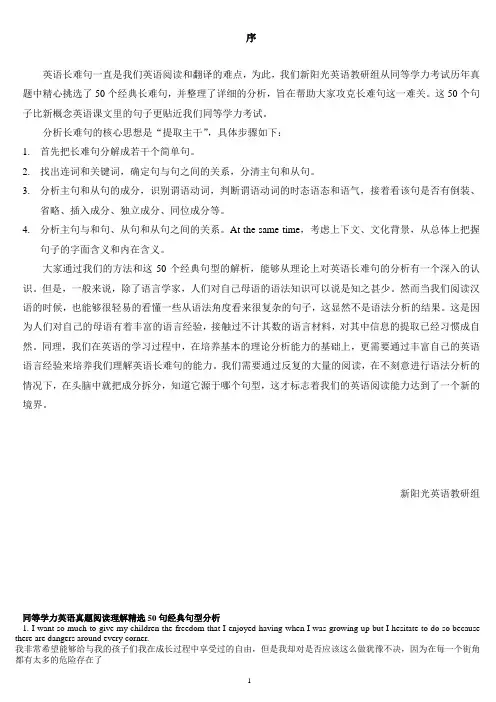
序英语长难句一直是我们英语阅读和翻译的难点,为此,我们新阳光英语教研组从同等学力考试历年真题中精心挑选了50个经典长难句,并整理了详细的分析,旨在帮助大家攻克长难句这一难关。
这50个句子比新概念英语课文里的句子更贴近我们同等学力考试。
分析长难句的核心思想是“提取主干”,具体步骤如下:1.首先把长难句分解成若干个简单句。
2.找出连词和关键词,确定句与句之间的关系,分清主句和从句。
3.分析主句和从句的成分,识别谓语动词,判断谓语动词的时态语态和语气,接着看该句是否有倒装、省略、插入成分、独立成分、同位成分等。
4.分析主句与和句、从句和从句之间的关系。
At the same time,考虑上下文、文化背景,从总体上把握句子的字面含义和内在含义。
大家通过我们的方法和这50个经典句型的解析,能够从理论上对英语长难句的分析有一个深入的认识。
但是,一般来说,除了语言学家,人们对自己母语的语法知识可以说是知之甚少。
然而当我们阅读汉语的时候,也能够很轻易的看懂一些从语法角度看来很复杂的句子,这显然不是语法分析的结果。
这是因为人们对自己的母语有着丰富的语言经验,接触过不计其数的语言材料,对其中信息的提取已经习惯成自然。
同理,我们在英语的学习过程中,在培养基本的理论分析能力的基础上,更需要通过丰富自己的英语语言经验来培养我们理解英语长难句的能力。
我们需要通过反复的大量的阅读,在不刻意进行语法分析的情况下,在头脑中就把成分拆分,知道它源于哪个句型,这才标志着我们的英语阅读能力达到了一个新的境界。
新阳光英语教研组同等学力英语真题阅读理解精选50句经典句型分析1. I want so much to give my children the freedom that I enjoyed having when I was growing up but I hesitate to do so because there are dangers around every corner.我非常希望能够给与我的孩子们我在成长过程中享受过的自由,但是我却对是否应该这么做犹豫不决,因为在每一个街角都有太多的危险存在了【串联句型】主语+谓语+宾语(不定式短语)+定语从句(包括一个时间状语从句)+表转折的状语从句(其中包括一个原因状语从句)【名师分析】定语从句是常考点,阅读文章中可能出现各种关系代词或关系副词引导的限定和非限定性两类定语从句。
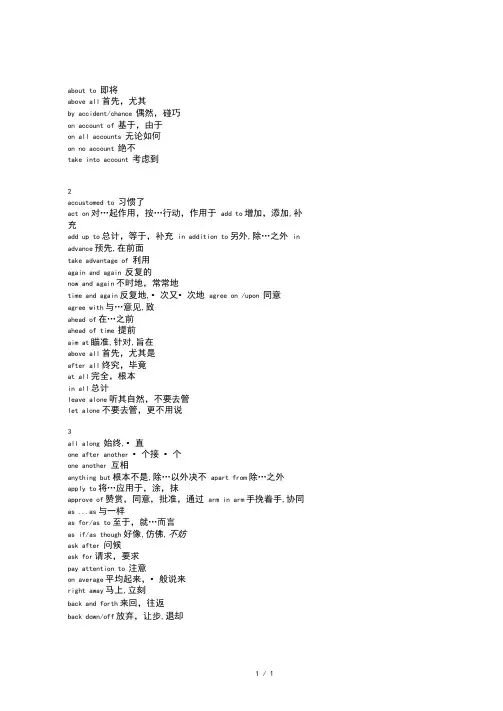
about to 即将above all首先,尤其by accident/chance 偶然,碰巧on account of 基于,由于on all accounts 无论如何on no account 绝不take into account 考虑到2accustomed to 习惯了act on对…起作用,按…行动,作用于add to增加,添加,补充add up to总计,等于,补充in addition to另外,除…之外in advance预先,在前面take advantage of 利用again and again 反复的now and again不时地,常常地time and again反复地,•次又•次地agree on /upon 同意agree with与…意见,致ahead of在…之前ahead of time 提前aim at瞄准,针对,旨在above all首先,尤其是after all终究,毕竟at all完全,根本in all总计leave alone听其自然,不要去管let alone不要去管,更不用说3all along 始终,•直one after another •个接•个one another 互相anything but根本不是,除…以外决不apart from除…之外apply to将…应用于,涂,抹approve of赞赏,同意,批准,通过arm in arm手挽着手,协同as ...as与一样as for/as to至于,就…而言as if/as though好像,仿佛,不妨ask after 问候ask for请求,要求pay attention to 注意on average平均起来,•般说来right away马上,立刻back and forth来回,往返back down/off放弃,让步,退却back up支持,援助have back要回,收回based on以…为基础on the basis of以…为基础because of由于,I大I为go to bed去睡觉begin with从…开始on behalf of代表,为・・・代表fall behind 落后4leave behind落后,把…留下,忘带believe in信仰,信奉,对…有信心benefit from 受益于at best/at the best 充其量,至多make the best of /make the most of 充分利用try one's best 尽力better off富裕起来,日子好起来for the better好转,向好的方向发展had better最好还是,应该by birth在血统上,天生地give birth to生育,产生a bit •点,少许a bit of •点儿的bit by bit •点点地,渐渐地on board在船(火车,飞机)上boast of /about夸耀,说大话both...and 既…又break away (from)脱离,逃跑break down分解,瓦解break in强行进入,闯入,打断,插嘴break into 闯入break off中止,中断break out突然发生,爆发5break through 突破break up打碎,拆散catch one's breath喘过气来,松口气hold one's breath 屏住呼吸out of breath上气不接下气in brief简单地说bring about 使发生bring forward将…提前,提议bring out使出现,使显明bring up抚养,教育:提出问题build up增长,积累,增强burn out 烧掉burn up烧尽burst into (tears/laughter)on business因公,因事by and by渐渐地,不久以后call for要求,需要call off取消,放弃call oiVupon访问,拜访,号召,呼吁call up打电话,召集,动员call down (使)平静下来capable of能…的,有…能力care about 关心care for照管,关心,喜欢,意欲take care留心,保重take care of照顾,照料,承当,处理,负责carry on继续,坚持下去,从事,经营carry out执行,贯彻6in any case不管怎样,无论如何in case假使,以防万一in the case of假如发生,万•发生catch fire着火,烧着catch up with 追上,赶上take a /the chance冒风险,碰运气in (the) charge of 负责take charge负责,看管take charge of负责(照)看,接管check in办理登记手续check out结账后离开,检验,核查check up / (up) on校对*,校验,核查cheer up兴奋起来under /in no circumstances在任何情况下都不clear away 清理clear up解释,澄清,(天气)变晴around the clock /round the clock 昼夜不断地.连续24 小时地have a cold患感冒catch a cold 感冒come about发生,产生come across偶遇,碰到come off成功,奏效come on请,来吧,快点come out出版,刊出,传出,显出,长出,结果是,结局是7come round /around来访,前来,苏醒,复原come through经历,脱险come to苏醒,复苏come true实现,达到come up出现,走上前来come up with 提出in common共同的,共有的compare ...to把…比作by comparison 比较起来as far as ...be concerned 就.•・而言on condition that 如果take ...into consideration 考虑到consist in 在于,存在consist of由…构成,由…组成8on the contrary 正相反in contrast with与…相对比/相对照contribute to为…出力/贡献out of control失去控制under control被控制住under the control of在…控制之下convince ...of 使信服correspond to相当于,对应,符合at all costs无论如何,不惜任何代价at the cost of以…为代价count in包括,算上count out不包括count up把…相加of course 当然cover up掩盖,遮盖cross out删去,取消9cut back削减,减少cut down削减,减少,降低cut in插嘴,打断cut off切拣,剪去,删去cut out切去,删除in danger在危险中out of danger脱离危险in the dark在暗中,秘密地out of date过时的,陈旧的up to date时兴的,切合目前情况的day and night日日夜夜day by day成天,天天every other day 每隔,天the other day 前几天in debt欠债,欠情deal with处理,对付,讨论a great deal/ a good deal许多,大量,・・.得多in some degree在某种程度上to a certain degree 在,定程度上take delight in 以…为乐in detail详细地die down渐渐消失,平息die off相继枯死,渐渐消失die out消失,灭绝make a difference有影响,很重要in difficulty处境困难dig into 探窕10dig out挖出,查出dig up开垦,查出,发现at a distance隔开•段距离in the distance 在远处keep a distance with与…保持距离do away with消灭,丢掉do/try one'best 尽力而为do without没有…也行,将就have nothing/something to do with 与…无关/有关no doubt无疑,必定draw in (汽车,火车)进站draw up写出,画出,草拟dress up穿出盛装,打扮得漂漂亮亮drop by/in顺便走访drop out逃学,离队出走due to由于on duty值班,当班off duty 下班each other 互相on earth到底,究竟take it easy别着急,慢慢来bring/come/go/put into effect 使生效,起作用take effect生成,见效in effect实际上,事实上either ...or或…或,不是…就是or else否则,要不然in the end 最后put an end to 使…终止end up以(某种身份,状态,境况)结束enjoy if/even though 即使,纵然11every now and then有时,时时,偶尔every other每隔,个的for example 例如except for除…以外with the exception of 除…外in existence 存在的to a certain/great/some extent 在•定/很大/某种程度上go to extremes 走极端catch sb/s eye引人注目keep an eye on 留神face to face面对面地in the face of 面对make faces /make a face 做鬼脸face up to大胆而对in fact实际上,其实as far as/ so far as只要,就…而言far from决不,决非by far远远…,…得多so far迄今为止find fault with 找岔子in favor of支持,有利于feel like 想要a few少许,一・些quite a few还不少,有相当数目figure out算出,估计,推测fill in填充,填写fill out填好,填写find out发现,查明,找出catch fire 着火make a fire 生火on fire燃烧着,兴奋者set fire to使燃烧,点燃at first 首先from the first 从头first of all 首先in the first place 首先focus on集中于12as follows 如下on foot步行so forth等等free from无…的,不…受影响的free of脱离,无…的get free获得自由set free 释放(be) friends with对…友好,与…交上朋友make friends交朋友,友好相处in front of在…前面,而对make fun of取笑,嘲弄in future今后,从今以后in the future 在将来in general通常,•般来说getacross解释清楚,使人了解get alone (with)相处,有进展,有起色get at到达,领会get away (from)逃离,离开13get down to着手进行get in收获,到达,进站getoff下车,从…下来,离开,动身,开始get on (with)继续做,上车,在…方面取得进展get out下车,出版,泄露get out of逃避,改掉get over克服,(从病中)恢复过来get through结束,完成,接通电话get together集会,聚会get up起床,起立give away泄露,暴露,出卖give back送还,恢复give in收获,到达,进站get off下车,从…下来,离开,动身,开始get on (with)继续做,上车,在…方面取得进展getoul下车,出版,泄露get over克服,(从病中)恢复过来get through结束,完成,接通电话get together集会,聚会get up起床,起立give away泄露,暴露,出卖give back送还,恢复give in投降,让步,认输give off发出,放出give out分发,分派give up放弃,辞去,投降,屈服go about从事,干,闲逛go after追逐,追求go ahead开始,前进,领先go along with陪同前往,随行go around /round 足够分配go by经过,放过,过去go for竭力想取得,喜爱,支持,拥护go in for从事,致力于,追求,沉迷于go into研究,讨论,调查,审查go off爆炸,被发射.离去14go on (with)继续,持续go on the stage 当演员go out出去,罢工go over浏览,读•遍,检查,复习,重说(读看) go through完成,做完,检查,审查,搜查go up上升,增长go with陪同前往,与…一致,与…调和go without没有,缺乏,将就,没有…也行for good永久,•劳永逸good at擅长于good for有效,适用,胜任take...for granted认为…理所当然on the ground of以・・・为理由on guard警戒,值班on one'guard 警戒者in half成两半at hand在手边,在附近by hand用手hand down传下来,传给,往下递hand in交上,递交hand in hand手拉手,联合,连在•起hand on传下来,依次传递hand out分发,发给hand over交出,移交,让给in hand在掌握中,正在进行on the one hand, on the other hand •方面,另,方面15hang about闲荡,徘徊,逗留hang on别挂(电话),紧抓不放hang on to紧握住,坚持下去hang up挂断(电话)have to/liave got to不得不”必须,牢记head for帽…走去at heart在内心,实质上by heart牢记,凭记忆heart and soul全心全意learn by heart 记住,背下lose heart丧失勇气,失去信心can not help doing sth.禁不住,忍不住help oneself自取所需here and there 到处,处处get hold of抓住,掌握hold back踌躇,退缩不前hold on稍后,别挂电话,坚持下去hold on to紧紧抓住hold out坚持,不屈服hold up举起,支撑,承载,阻挡,使停止at home在家,在国内,自在,自去in honor of向…表敬意,为庆祝…,为纪念…keep house管理家务how about如何,怎么样hurry up使赶快,迅速完成in a hurry匆忙,立即16if only但愿,只要what if倘若…将会怎么样insist oiVupon坚持,坚持认为for instance举例说,比如instead of 代替interfere in /with 妨碍by itself单独地,独自地keep back阻止,阻挡,隐瞒,保留keep down控制,压制,镇压,压低,放低(声音)keep off不接近,避开keep on继续,保持keep out of躲开,置身…之外keep up继续,坚持,保持,维持keep up with跟上,不落后knock down撞倒,击倒knock out打昏,淘汰at large总的,•股,在逃at last最终,终于laugh at讥笑,嘲笑lay down放下,拟定,铺设lay off (临时)解雇,休息lay out安排,布置,设计,摆开,陈列,展示17lead to通向,导致,引起at least最低限度in the least •点,丝亳leave out省略,遗漏let down放下,降低,使失望let go放开,放手let in让…进入,放…进来let off放(炮,烟火),开枪let out放出,发出,放大(衣服)throw light on使…显得清楚,阐明…line up排队,使排成一行a little 一些,少许,稍许,-点儿live on/by靠…生活,以…为食live through度过,经受住live up to无愧于,不辜负as long as/so long as 只要,如果,既然18_before long不久以后no longer不再,己不look after照顾,关心,照料look at看,注视look back回顾,回头看look down upon 看不起look for寻找,寻求look forward to 盼望,期待look in顺便看望,顺便,访问look into窥视,调查,过问look on旁观,观看look out注意,警惕look over检查,查看,调查look through浏览,温习look up to尊敬,敬仰look up查找,查阅,寻找,查出at a loss困惑,不知所措a lot/a lot of/lots of大量,许多,非常,相当fall in love (with)相爱,爱上(be) made from由…制造(be) made up of由…组成/构成make for走向,冲向make out开列,书写,看出,辨认出,理解,了解make up拚凑,组成,构成,编造(故事,谎言等) make up for 补偿,弥补a great many /a good many 许多,大量as a matter of fact实际情况,真相no matter无论,不管…19by all means ,定,务必by any means无论如何by no means 绝不by means of 用,凭借in memory of 纪念at the mercy of在…支配下bear /liave/keep...in mind i已在心、里change one's mind 改变主意make up one's mind 决定,下决心never mind不要紧,没关系by mistake错误地mistake ...for将…误认为mix up混合,混淆,搞糊涂at the moment 此刻for the moment 暂时,目前in a moment •会儿all the more 越发more or less或多或少no more不再20no more than不过,仅仅at most/at the most 最多,至多in the name of以…的名义neither ...nor既不…也不from now on从今以后just now刚才,刚刚now and then时而,不时now that 既然a number of 许多have on穿着…,戴着…on and off断断续续,不时地so on等等(all) at once 突然once in a while 偶尔,有时once again /more/over 再•次,又,次once and again •而再,再三once for all再也不,,劳永逸once upon a time 从前not only ...but (also)不仅…而且bring /put into operation 使实施,使执行come /go into operation 实施,执行in order整齐,秩序井然in order that 以便in order to 以便,为了out of order发生故障,失调other than 除…all out全力以赴out of在…外,离开,从…里,出于,缺乏,没有all over到处,遍及owing to由于,因为on one's own独自,靠自己keep pace with与…保持,致21take pains尽力,煞费苦心take part (in)参加,参与in particular特别,尤其,详细地pass away去世,逝世pass on传递,向前pass over省略,忽略pass out失去知觉,昏倒pay back偿还,回报pay for付款,偿还payoff偿清,取得成功in person 亲自pick out选出,挑选(货),增加pick up捡起,拾起,(车船等)中途搭(人)/带in place在适当的位置in place of 代替in the first place 首先,第,take place发生,进行take the place of 代替out of place不适当的,不得其所的play with以…为消遣,玩弄beside the point离题,不相干22to the point切中要害,对准point out指出,指明in a position to有能力做…in practice实际上,在实践中out of practice久不练习,荒疏put ...into practice 加以实施at present目前,现在for the present 目前,暂时in proportion to与…成比例in public公开地pull down拉倒,拆毁pull in (车,船等)进站,够岸pull off完成(•件艰难的事情)pull out拔出,抽出,取出,(车,船等)出站on purpose故意,有意put across解释清楚,说明put aside储存,保留put away把…收起来,放好put down记下,写下put forward 提出put off推迟,拖延put on穿上,戴上,上演,增加(体重)put out熄灭,消灭,灭(灯),生产,发布put up举起,升起,提价,为…提供食宿,建造,搭起,支起,张贴put up with容忍,忍受beyond/without question 没问题in question在考虑中,在议论中的out of the question不可能的,办不到的23queue up 排队at random随机地,无目的地at any rate无论如何,至少rather than而彳"彳:顾would rather宁愿,宁可be/get ready for愿意,准备好refer to查阅,提到,谈到reflect on/upon 思索as regards关于,至于24regardless of不顾,不管…如何rely on依靠,信赖remind sb. of使想起,提起,提醒with respect to 关于rest on依靠as a result由于,因此result from 起因于result in 导致in return (for)作为回报,作为报答get rid of摆脱,除去all right行,可以,顺利,良好be in the right 有理的ring off挂断(电话)ring up打电话give rise to引起,造成on the road在旅途中rub out擦擦,拭去as a rule 通常run across偶然遇到25run down撞倒,撞沉run for竞选run into偶然碰到,撞见,碰到run out of用光,耗尽run over浏览,匆匆复习run through匆匆地看in the long run最终,从长远观点看for the sake of 为了…on sale上市,出售,减价,贱卖for sale 待售all the same仍然,照样地that is to say也就是说it goes without saying 不言而喻26on schedule按预定时间in search of寻找,寻求in secret秘密地,私下地see about调查,查询see after照应,照顾see into调查,检查see off给…送行see to it (that)负责,照料,注意,留心see through看穿,识破see after/for搜寻,寻找,寻觅send for派人请,召唤,索取send in呈报,提交,送来send off 寄发in a sense从某种意义上说serve as担任,起…作用set about开始,着手,出发set aside宣布无效,驳回,废止,留出27set back推迟,延缓,阻碍set down记下,写下set forth提出,阐明,出发setoff动身,出发,使爆炸,使爆发,引起set out动身,出发,开始,制定,打算set up建立,设立,树立,资助,使自立,扶持settle down定居,过安定的生活cut short打断,缩减fall /run short (of)缺少,快用完for short简称,缩写in short简言之,总之show in领入show off炫耀,卖弄show up使显现,使醒目shut down 关闭28shutout 排除shut up住口,关上全部门窗sick of厌烦side by side 肩并肩at first sight初看,乍看catch /have/get sight of 看•至ij,发现insight被见到,在望lost sight (of)没看见,失明out of sight看不见,在视野以外sit up迟睡,熬夜slow down放慢速度or so大约,左右so that以便,为的是,结果是,以致so…as to如此…以至于,如此…以便so…that如此…以至于as soon as •…就no sooner ...than ,…就sooner or later 迟早,早晚speak for替…讲话speak of 谈到speak out大声说speed up使加速in spite of尽管,不顾,虽然on the spot当场,在现场stand by站在旁边,袖手旁观,站在,起,支持,帮助29stand for 代替stand out突出,显眼stand up站起,竖起stand up for为…辩护,维护stand up to勇敢地面对,坚决抵抗step by step 逐步step down让位,下台step in插入,介入step up提高,加快,加紧stick to坚持,忠于,信守substitute for替代,取代,代替such as像…那样的,诸如such ...that那样的…以致all of a sudden 突然sum up总结,概括(be) sure of 确信make sure (of)查明,弄确实for sure当然,,定,肯定,亳无疑问take after与…相像take apart 拆开take back收回,带回take down记下,写下take...for认为,以为30lake in接受,容纳,领会,理解,欺骗take off拿走,脱下,起飞take on呈现,具有,装出,接纳,接受,承担,从事take over接管,接收lake up占去,占据,开始从事,拿起,捡起talk back 顶嘴talk into 说服talk over商量,讨论in tears流着泪,含泪,哭in good/bad temper 心情好/不好keep one's temper 忍住性「lose one's temper 发火,发脾,thanks to由于,多亏that is就是说,即thank better of改变主意,重新考虑thank of想到,想起thank of...as把…认为是thank over仔细考虑throwaway扔掉,抛弃throw up 呕吐all the time •直at a time每次,•次at all times总是,无论何时at any time在任何时候at no time从不,决不at the same time 同时,然而at times 有时for the time being 目前,暂时from time to time 时常in no time立即,马上in time及时地,适时地on time准时take one's time不急不忙,从容进行31on top of 在..•之上keep in touch保持联系out of touch失去联系touch on关系到,涉及try on试穿try out试验by turns轮流,交替地in turn依次,轮流take turns 轮流turn down调低,关小turn in交出,上缴,转身进入,拐入turn into使变成turn off关,关闭turn on打开,拧开turn out生产,制造,驱逐,使离开,证明是,结果是turn over翻过来,翻倒,思考,考虑,移交,转交turn to转向,求助于turn up出现,发生up to •直到,等于,从事于,忙于make use of 利用put...to use使用,予以利用use up用光,花完be/get used to 习惯于used to (过去)总是as usual像往常,样,照例a variety of多种的,各种各样的in view of鉴于,考虑到,由于wait on侍候ward off避开,防止warm up变热watch out (for)戒备,提防32by the way顺便提•下,另外by way of通过..・方式get in the way成为障碍give way to让位于,被…代替in a way在某种程度上,从某•点看in one's way/in the way 妨碍,阻碍lead the way带路,引路make one's way 前进,行进make way (for)开路,让路in no way 决不out of the way不寻常的,已解决的under way进行中wear down磨损,损耗,使疲劳wear out穿坏,(使)耗尽as well同样,也倒不如as well as既…又,除…之夕卜(还)what about (对于)…怎么样what if如果…将会怎样,即使…又有什么要紧whether...or是…还是,不管…还是after a while 过了 ,会once in a while 偶尔on the whole总的来说wipe out消灭,毁灭no wonder难怪,怪不得have a word with sb.和某人谈谈in a word总而言之in other words换句话说,也就是说33keep one's word 守信用leave word 留言word for word 逐字的at word在工作,忙于out of word 失业work at/on 从事work out解决,算出,设计出,指定出work up引起,激起,逐渐向上,向上爬work about 担心。
1.不规则动词的词型变化动词原形过去时过去分词bear 忍受bore borne, bornbend 弯曲bent bentbid 表示bade, bid bidden bid2. 动词词形相近,词义不同(有些动词在词形上相似,但其词义是不同的)compliment vt. 赞美He is complimented for his finework.complement vt.补充They need to complement thefactory with more workers.adapt vt. 使适应We have to adapt our thinkingto the new circumstances.adopt vt. 采用They have adopted closeplanting.3. 动词词义相近,用法不同consist vt. 这个动词一般用于主动态This class consists of forty students.compose vt. compose 常用于被动语态This country is composed of ten nations.compriseconstitute4. 动词后需用动名词(有一批动词的后面只能使用动名词)anticipate avoid d elay envy escapemiss mind risk5. 动词后需用不定式(英语动词中,还有一些动词的后面只能使用不定式)claim arrange demand determineexpect intendpretend promise6. 动词后可用动名词或不定式continue dislike prefer begin like7. 动词固定搭配1) 动词与介词的搭配call for call off carry off come by come up to cut down2) 动词与名词的搭配arrive at a conclusiontake into considerationreach an agreementbreak one’s promise3) 动词与名词和介词的搭配have control over 对...控制attach importance to 重视完型Test3 enables regard likely to, Target particular efficientlyPersuasive as a result InsteadAn initial at length in which Common survey conclusive阅读P18 passage baddc英译汉这一趋势在美国是对经济衰落的反映,它是在20世纪80年代后期企业缩小规模致使大规模裁员之后才开始,现在仍和节俭的观点密切相关;而在英国,至少在我所认识的那写过慢节拍生活的中产阶级当中,寻求朴素的生活方式却有着不同的原因。
目录同等学力申硕英语指南——完型填空 (1)一、对词汇知识的掌握 (7)二、对语法知识的要求 (11)三、对篇章的理解能力的要求 (55)同等学力申硕英语指南——辨错 (55)一、时态语态常见错误设置及答题思路 (57)二、虚拟语气常见错误设置及答题思路 (59)三、情态动词常见错误设置及答题思路 (63)四、非谓语动词常见错误设置及答题思路 (65)五、一致关系常见错误设置及答题思路 (71)六、倒装结构常见错误设置及答题思路 (75)七、形容词、副词和比较结构常见错误设置及答题思路 (78)八、并列结构常见错误设置及答题思路 (82)九、从属结构常见错误设置及答题思路 (84)07同等学力英语复习计划 (88)辅导课程设置 (93)同等学力申硕英语指南—完型填空示例:2006年同等学力英语真题完型填空部分Part IV Cloze 完型填空(15 minutes, 15 points, 1 for each )Advertising is a form of selling. For thousands of years there been individuals who have tried to 56 others to buy the food they have produced or the goods they have made or the services they can 57 .But in the 19th century the mass production of goods 58 the Industrial Revolution madeperson-to-person selling inefficient. The mass distribution of goods that 59 the development of the railway and highway made person-to-person selling too slow and expensive. At the same time mass communication first newspapers and magazines then radio and television made mass selling through 60 possible.The objective of any advertisement is to convince people that it is in their best 61 to take the action the advertiser is recommending. The action 62 be to purchase a product use a service vote for a political candidate or even to join the Army.Advertising as a 63 developed first and most rapidly in the United States the country that uses it tothe greatest 64 In 1980 advertising expenditures inthe U.S. exceeded 55 billion dollars or 65 2 percent of the gross national product. Canada spent about 1.2 percent of its gross national product 66 advertising.67 advertising brings the economies of mass selling to the manufacturer it produces benefits for theconsumer 68 . Some of those economies are passed along to the purchaser so that the cost of a product sold primarily through advertising is usually far 69 than one sold through personal salespeople. Advertising brings people immediate news about products that have just come on the market. Finally advertising 70 for the programs on commercial television and radio and for about two thirds of the cost of publishing magazine and newspapers.56.A.request B. oblige C. affect D. persuade57.A.transfer B. secure C. enjoy D. perform58.A.resulting from B. dealing with C. leading toD. going for59.A.followed B. preceded C.ach5eved D. induced60. A. marketing B. advertisingC. salespeople D agents61. A. profits B. benefits C. interests D. gains62.A. should B. would C. may D. will63. A. business B. service C product D. profession64. A. amount B. extent C. possibility D. utility 65, A similarly B. supposedlyC. approximatelyD. accountably66. A. with B. at C. into D. on67. A. While B. Therefore C. But D. If68. A. as well B. as usual C. as a result D. as a rule69. A. more B. less C. cheaper D. dearer70. A. works B. calls C. looks D. pays答案解析:短文概要:本文介绍了广告的历史沿革以及在发达国家其对促进商业繁荣所起的重要作用。
同等学力申请硕士学位英语语法——定语从句讲义欢迎使用新东方在线电子教材限定性定语从句定语从句非限定性定语从句两步解题法1.抓先行项(指人、物、整句话内容)2.抓关系词在定语从句中的成分关系代词 --作主、宾、表、定语关系词关系副词 --作状语e.g. This is the house① I once lived.② I once visited.① where / in which② that / which / XThis is the very house I once visited.e.g. I’ll never forget the day① I met him.② I spent with him.① when / on which② that / which / XI’ll never forget the very day I spent with him.词+ 句子A whatB whichC that词,+ 句子A whatB whichC thatn 介词 + which + 主 + 谓 + 宾介词 + whom + 主 + 谓 + 宾固搭固搭The food on which he depends is expensive.We need a chairman in whom we have confidence.have confidence in be confident ofWe were struck by the extend to which the teacher’s decision served the interests of the school rather than those of the students.I listen to what he said.…set at C they would be if ….A whichB thatC whatD who① 固定搭配② 介词与like 区别③ 原因状从④ 比较状从as⑤ 方式状从⑥ 让步倒装⑦ 时间状从⑧ 定语从句as 引导的限定性定语从句such…as (不完整句子)the same…as(不完整句子)注意与 such … that 区别such … that(完整句子)e.g. It wasn’t such a good dinner B she had promised us.A. thatB. asC. whichD. whatpromise sb sthe.g. There was such a long line at the exhibition A we had to wait for about an hour.A. thatB. asC. soD. hencewait for me for a long timee.g. It is language B distinguishes man from the rest of the animal world.A.whatB. thatC. Aswhose 表所属关系“…的”n + (,)whose + n.I know a girl whose name is Mary.I like the room whose window faces the south. The book, the cover B is broken, isn’t mine.A whose B. of whichThe book , A cover is broken, isn’t mine.A.whoseB. of which。
同等学力英语必备词组同等学力考试是一种特殊的考试形式,即使没有本科学历,依然可以通过该考试取得与本科学历相等的学位。
而在同等学力考试中,英语的考试成绩是一个非常重要的指标。
掌握一些必备的英语词组对于同等学力考试的顺利通过至关重要。
本文将为大家介绍一些同等学力英语必备词组。
1. 解决问题类词组(1) Find a solution to:找到解决办法(2) Deal with a problem:处理问题(3) Solve a difficulty:解决困难(4) Overcome an obstacle:克服障碍(5) Tackle a challenge:应对挑战(6) Address an issue:处理问题(7) Resolve a conflict:解决冲突2. 表达观点类词组(1) In my opinion:我认为(2) From my perspective:从我的角度来看(3) It is widely believed that:普遍认为(4) According to the research:根据研究(5) It is clear that:很明显(6) It can be concluded that:可以得出结论(7) I strongly believe that:我坚信3. 描述事物类词组(1) In addition:另外(2) Furthermore:此外(3) Moreover:而且(4) On the contrary:相反地(5) Conversely:反过来说(6) Likewise:同样地(7) Similarly:类似地4. 强调重要性类词组(1) It is crucial to:对于...极为重要(2) It is essential to:对于...至关重要(3) It is vital to:对于...非常重要(4) It is of great significance to:对于...具有重大意义(5) It plays a critical role in:在...中起到关键作用(6) It is indispensable for:对于...是不可或缺的(7) It is of utmost importance to:对于...至关重要5. 表示原因类词组(1) Due to:由于(2) Because of:因为(3) Owing to:因为(4) Thanks to:幸亏(5) As a result of:由于...的结果(6) On account of:由于(7) In light of:考虑到6. 总结归纳类词组(1) In conclusion:总之(2) To sum up:总结起来(3) All in all:总的来说(4) In a nutshell:简言之(5) Taking everything into account:将所有因素考虑进去(6) To put it simply:简单地说(7) In summary:概括地说以上是一些同等学力英语必备词组,通过掌握这些词组,你的同等学力英语考试将更加得心应手。
同等学力申硕英语语法基础电子讲义一、定语从句简单句的结构特点简单句分为两种(中文书、英文书)简单句的基本形式在简单句中动词是最重要的fly : I fly.(主谓结构)love : I love you.(主谓宾)am : I am ugly.(主系表)give : I give you money. (主谓间宾直宾)make : Loneliness makes you happy.(主谓宾宾补)分三个层次对以上各句进行系统分析1. 主谓/ 主谓宾2. 主谓宾/ 主系表3. 主谓间宾直宾/ 主谓宾宾补1. 主谓/ 主谓宾I fly.(主谓结构)I love you.(主谓宾)不及物动词是指能够独立而完整的描述主语的性质和状态的动词句子的构成:由被描述成分和描述成分构成及物动词是指不能够独立而完整的描述主语的性质和状态的动词宾语是指动作的作用对象2. 主谓宾/ 主系表I love you.(主谓宾)I am ugly.(主系表)在判断主系表结构时,注意要先判断表语。
表语就是直接表述主语性质和状态的非动词predicate 谓语predicative 表语联系动词简称系动词,系动词没有起太多的实际意义,其最大作用是标志句子的存在。
在这样的句子中,表意的主要是主语和表语。
因为系动词不是主语所发出的动作,所以没有语态的分别。
例题:The bike is ridden well. ( ride ) well adv. 修饰动词或形容词自行车被骑得很好。
The bike rides good. ( ride ) good adj. 只能修饰名词自行车骑起来很好。
3. 主谓间宾直宾/ 主谓宾宾补give : I give you money. (主谓间宾直宾)make : Loneliness makes you happy.(主谓宾宾补)I buy you a book. (主谓间宾直宾)我给你买了一本书Loneliness makes you happy.(主谓宾宾补)I buy you a book.I 主语buy 谓语you 动作完成之后的受益者,叫做间接宾语a book 谓语的作用对象,真正的宾语,叫做直接宾语I buy a book for you. 结构:主+谓+直宾+介词+间宾对这两种结构的区别方式:看句子能否写成主+谓+直宾+介词+间宾Loneliness makes you happy.Loneliness 主语makes 谓语you 宾语happy 修饰you ,补充说明宾语性质和状态的成分被称为宾语补足语定语是宾语本身所具有的状态,而宾语补足语是谓语动词作用之后的结果对这两种结构的区别方式:①看句子能否写成主+谓+直宾+介词+间宾②看后面的成分是不是宾语的性质和状态定语和状语I love you.在十年之前,在新东方的一个漆黑的教室里,丑陋无比的我爱上了美若天仙的你。
同等学力英语语法总结
同等学力英语比较状语从句
常见引导词:as(同级比较), than(不同程度的比较)
特殊引导词:the more … the more … ; just
as …, so…;
A is to
B what /as X is to Y; no … more than; not A so much as B
She is as bad-tempered as her mother.
她和她妈一样脾气暴躁。
The house is three times as big as ours.
这所房子是我们的三倍大。
The more you exercise, the healthier you will be.
越锻炼你就越健康。
Food is to men what oil is to machine.
食物之于人,犹如油之于机器。
同等学力英语让步状语从句
引导让步状语从句的连词和词组:although, though(虽然);even if,even though(即使);as,while(尽管);whether…or(不论……还是);whoever,no matter who(无论谁);
whenever, no matter when(无论何时);however,no matter how(无论怎样);whatever,no matter what(无论什么)等。
(1)although和though都表示“虽然”,但although比though正式,更多用于句首;二者都可与yet,still或nevertheless连用,但不能和but连用:
He didn’t stop working though(或although)he was ill.
她虽然病了,但未停止工作。
(2)as引导的让步状语从句要用倒装语序,可用though代替,但比though语气强,被倒装的部分能够是表语、状语和动词原形:
Child as(或though)he is, he knows a lot.[表语;名词]
她虽然是个孩子,但懂得很多。
▲当表语是可数名词单数时,不能加不定冠词a (或an)。
Good as he is, he will never be top of his class.[表语;形容词]
她虽然很好,但她决不会成为班上的尖子。
Hard as(或though)he works, he makes little
progress.[状语;副词]
虽然她工作很努力,但却几乎没有进步。
Try as(或though)he might, he could not find a job.[谓语;动词原形]
不论她怎么努力,她还是找不到工作。
(3)while有时可引导让步状语从句,但一般
要位于句首:
While I like the color, I don’t like the shape.
我虽然喜欢那颜色,但不喜欢那形状。
(4)whatever(或whenever…)和no matter what(或when…)二者都可引导让步状语从句,但前者有时还能够引出主语从句和宾语从句等,后者
却不行:
Whatever(或No matter what)you say, I won’t believe you.(状语从句)
不论你说什么,我决不相信你的话。
I’ll eat whatever(≠no matter what)you give me.[宾语从句]
你给我什么我就吃什么。
同等学力英语方式状语从句
引导方式状语从句的连词:as(如同);as if (或as though)(仿佛)。
(1)as和like都有“就像”的意思,as是连词,后加句子;like是介词,后加名词、代词或名词性短语:
I work as others do(或like others).
我像别人那样工作。
(2)as if,as though两者意义相同,从句谓语动词常见虚拟语气,as if比as though更常见:
They are talking as if (或as though)they had seen a ghost.
她们谈着话,就像是见了鬼。
▲as if和as though有时可引导表语从句。
同等学力英语条件状语从句
引导条件状语从句的连词或词组:if,suppose,supposing(that),provided,providing (that),on condition that(如果,假如);unless(除非);so(或as)long as(只要);in case(万一)。
在条件状语从句中,要用一般时态代替将来时。